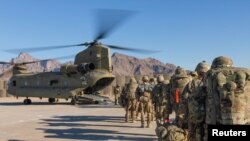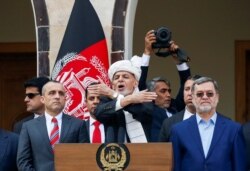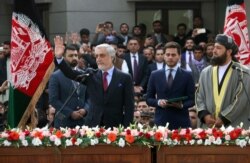Afghanistan’s President Ashraf Ghani issued a decree late Tuesday setting in motion the process of releasing thousands of Taliban prisoners as the U.S. Military begins a troop drawdown in the country — steps outlined in a deal with the Islamist insurgent group aimed at ending the nearly 19-year-old war.
The U.S.-Taliban agreement sealed in Qatar 10 days ago requires all American and coalition forces to leave the country in the next 14 months, subject to insurgent counterterrorism assurances and commitments the Taliban would seek a political reconciliation with other Afghan stakeholders.
“U.S. Forces Afghanistan (USFOR-A) has begun its conditions-based reduction of forces to 8,600 over 135 days,” said U.S. military spokesman Col. Sonny Leggett. There are about 13,000 troops stationed in the country.
Leggett underscored the drawdown would ensure the U.S. military retains necessary means and capabilities to provide support to Afghan security forces and conduct counterterrorism operations.
The crucial next step of opening peace negotiations between Afghan parties to the conflict requires the release of up to 5,000 insurgent prisoners from Afghan jails in exchange for 1,000 detainees, mostly government security forces, in Taliban custody.
“President Ghani has signed the decree that would facilitate the release of the Taliban prisoners in accordance with an accepted framework for the start of negotiation between the Taliban and the Afghan government,” chief presidential spokesman Sediq Sediqqi said in a late night tweet.
The national election commission last month declared incumbent Ghani the winner of the disputed September 28 polls. But his main rival and governing partner in the outgoing government, Abdullah Abdullah, rejected the outcome as fraudulent and vowed to establish his own government.
On Monday, both Ghani and Abdullah took part in parallel swearing-in ceremonies, fueling the political crisis and posing a serious challenge to the U.S.-led peace initiative to end decades of hostilities in Afghanistan.
The divisions have raised questions about whether Afghan political forces and civil society would be able to form an inclusive team to engage in peace talks with the Taliban.
Monday’s unprecedented political development is troubling for Washington and the rest of the international community, though most of the diplomatic missions in Kabul, including the U.S. embassy, attended Ghani’s inauguration.
Dawa Khan Meenapal, the deputy Afghan presidential spokesman, acknowledged Tuesday, while speaking to VOA, that the prisoner swap issue and the presidential swearing-in were to blame for the the delay in opening negotiations with the Taliban.
Meenapal said that a list of negotiators for peace talks with the Taliban team has also been prepared.
“The United States strongly supports a unified and sovereign Afghanistan and is engaged in intensive efforts for peace,” Secretary of State Mike Pompeo said in a statement in reaction to the Afghan political tensions. But he emphasized that Washington was strongly opposed to any action to establish a parallel government and the use of force to resolve political rifts.
“We welcome President Ghani’s statement at his inauguration March 9 that discussions and negotiations will continue for the next two weeks to come to an agreement on an inclusive government which unifies the country and prioritizes peace,” Pompeo noted.
The presidential decree has instructed jail authorities to free a first batch of 1,500 Taliban prisoners starting Saturday.
Sediqqi said once direct talks with the Taliban begin, the Afghan government will release 500 prisoners every two weeks until another 3,500 are freed, subject to a significant reduction in Taliban violence.
U.S. special representative for Afghan reconciliation Zalmay Khalilzad swiftly offered his reaction to the presidential decree, saying the he Taliban had already agreed to free 1,000 prisoners from the Afghan government side.
“I urge the two sides to sit down immediately for talks on this issue in Doha, Qatar to work out the details. The Afghan government has agreed to do so. When implemented, this will be a significant step in the peace process,” Khalilzad said.
The presidential decree has instructed jail authorities to free a first batch of 1,500 Taliban prisoners on Saturday after seeking written commitments they would not return to the battlefield.
“We have shared details of 5,000 persons [Taliban prisoners] with the American side and the list cannot be tampered with,” Taliban political spokesman Suhail Shaheen warned in a statement.
“Whether these persons are handed over to us in a desert or inside Afghan jails, our team will thoroughly countercheck their identities before accepting them back,” Shaheen said.
Afghan officials have not immediately responded to Taliban allegations.






